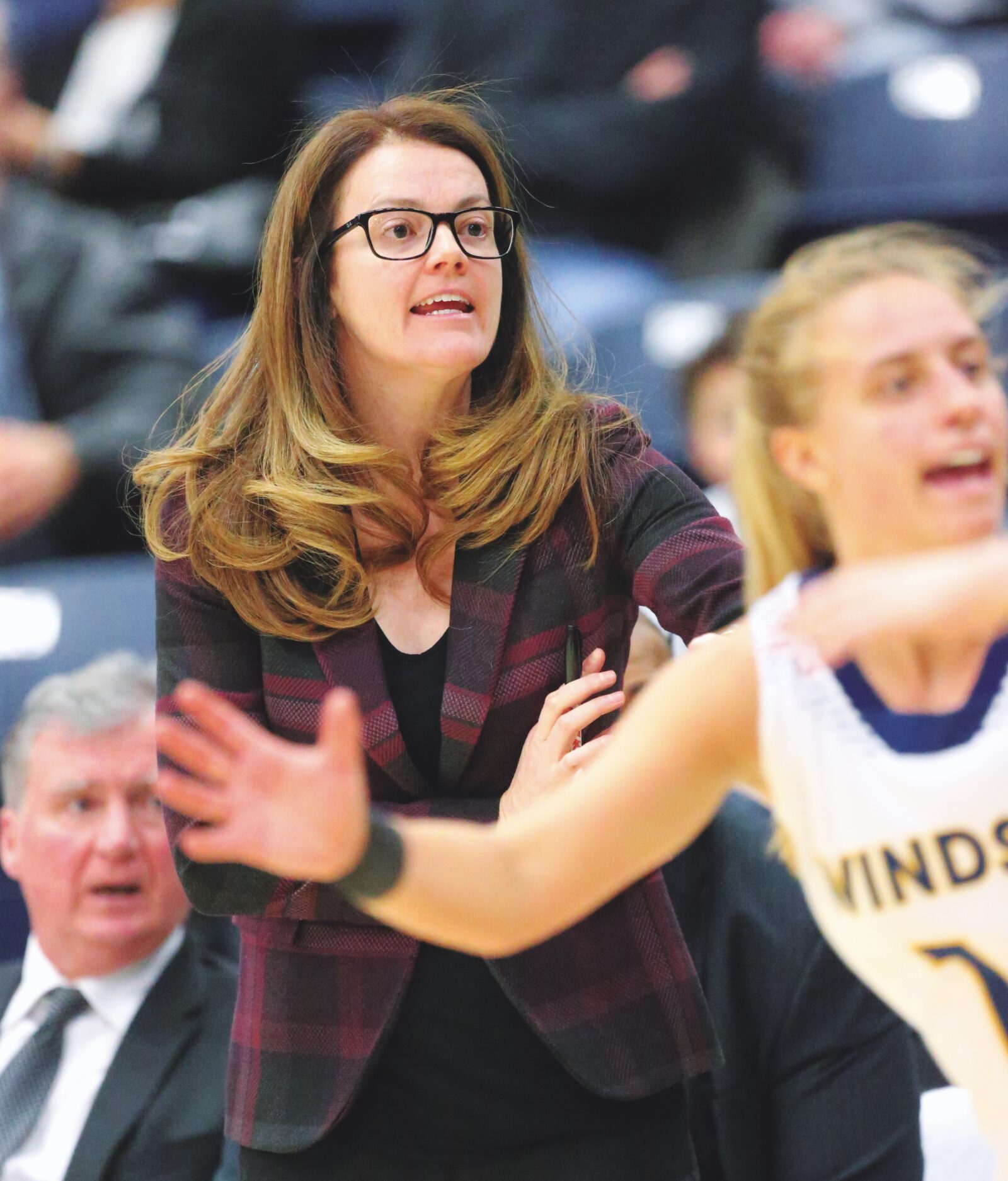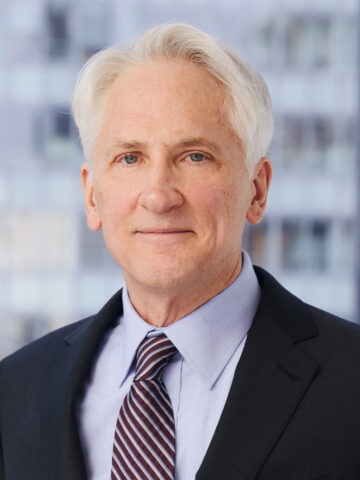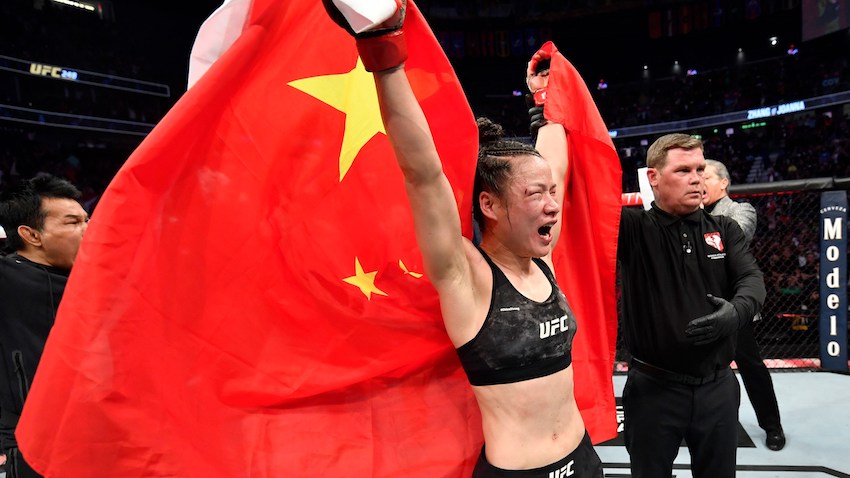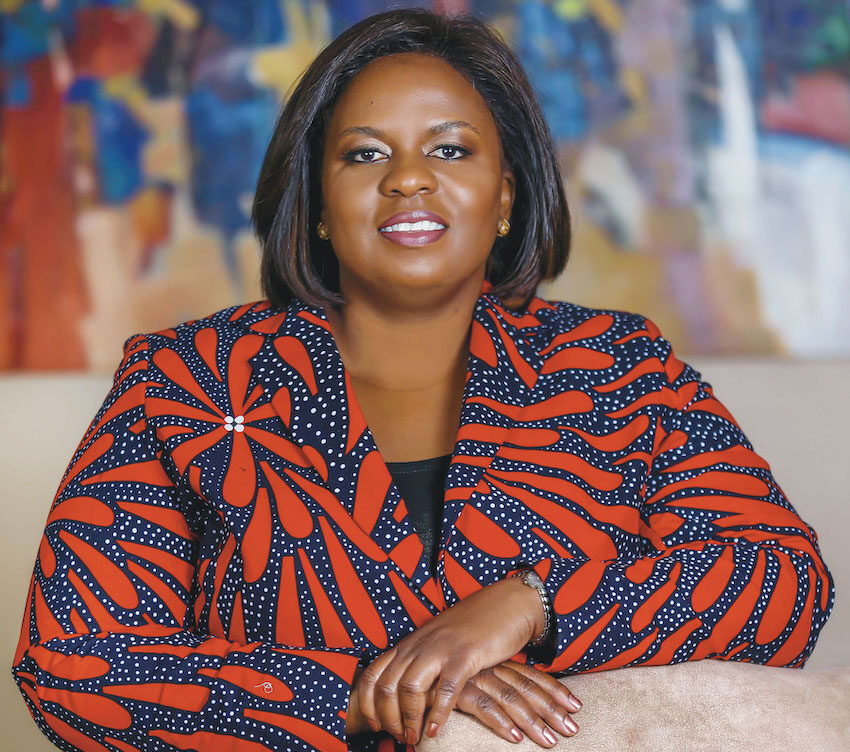After transforming Canada’s worst college basketball team into a five-time national champion, Chantal Vallée is seeking to transform women’s sports.
In obtaining a graduate degree in sports psychology, Chantal Vallée devoted years of research to a question often debated on barstools: What makes a coach great?
After publishing her findings in a thesis, Vallée longed to put them into practice. Of the multiple college coaching jobs she sought, only one offer materialized—the University of Windsor. In 50 years, the Windsor women’s basketball team hadn’t won a trophy, posting 46 losing seasons. It was a laughingstock of Canadian collegiate women’s basketball. “I was told taking that job would be professional suicide,” Vallée recalls.
She took the job. Six long years later, Vallée led the women Lancers to a national basketball championship. It was the kind of turnaround that might have caught the attention of Hollywood, if it hadn’t taken place in Windsor, a working-class auto town across the Canadian border from Detroit. Years earlier, Windsor had been chosen as the site of the 2011 national championship game. Now, by fortuitous coincidence, the Lancers won the national title in their own arena, prompting seemingly every resident of Windsor to storm the court. In tears, Vallée danced amid confetti, hugged player after player, shouting in jubilation. Then that euphoria ended, right there on the court.
“For six years, I’d worked 80-120 hours a week, sacrificing a social life, and now that we’d achieved our goal, a national title, I felt completely empty. I thought, ‘That’s it?’”
No, that wasn’t it. In 2012, the Windsor women’s basketball team won their second title. The next year, their third. In 2014, they did it again. In 2015, they made it five straight. In collegiate basketball coaching, five consecutive titles brings to mind John Wooden, who coached UCLA to seven straight basketball titles, and Geno Auriemma, who coached the UConn women’s team to four consecutive titles.
Vallée’s success was beyond the highest hopes of Gord Grace, the Windsor Athletic Director who had hired her. “What did I like best?” asks Grace, now CEO of Ontario University Athletics. “Her preparation, her high expectations, her commitment, her journey, her mental toughness, her leadership and her confidence.” A former men’s head coach himself, Grace adds, “I never thought she’d become the GOAT of coaches in Canadian University Women’s Basketball. But I did feel that she would set new standards and expectations at the University of Windsor.”
If anything, that first national title only raised expectations. “When I joined the basketball team, Chantal told us we would be ending the season as repeat national champions,” recalls Bethanie Wachna Quakenbush. “The idea coming out of her mouth sounded crazy and unrealistic. But the determination on her face and sincerity in her words convinced us otherwise.
“Every day was a grind and a true test of our character. But it was her unwavering belief in us, and in our capabilities as women, that gave us the self-confidence to persevere until we made it to the top as national champions once more.”
The Vallée effect raised standards across the conference. Before her arrival, a sense of inevitability had hardened around the superiority of teams from the west of Canada, which year after year won the women’s college basketball title. To the east, teams in the Ontario province had come to accept a distant-second status. “With the arrival of Coach Vallée, that very quickly changed, primarily because of her knowledge, relentless work ethic and attention to detail,” says Dave Wilson, Head Coach for nearly 40 years of the Queen’s University women’s basketball team, a Windsor rival.
“There is no justifiable reason why athletes who train just as hard and deliver just as exciting a product shouldn’t be equally rewarded—with sponsorships, visibility and respect.”
“As an opposing coach, I found her teams to be very disciplined and extremely well versed about our players, their tendencies and our team tactics. As she garnered almost instant success, frustrating many coaches around the country with win after win, I believe it was her unprecedented five consecutive National Championship successes that drove coaches, particularly in her own conference, to realize that each coach needed to raise their own coaching game to be able to challenge Windsor,” says Wilson. “Coach Vallée was instrumental in raising the level of the game, particularly in Ontario, but throughout the country as well.”
Was it a fluke, perhaps a perfect and peculiar matching of time, place, players and coach? Could Vallée reproduce her success elsewhere? Determined to find out, the owners of an upstart men’s professional team called the Hamilton Honey Badgers offered Vallée a one-year contract as Head Coach. The offer didn’t even require her to leave University of Windsor, because as a faculty member she was due a sabbatical. Accepting the offer, she became the first woman in the world to serve as GM and Head Coach of a men’s professional team.
As every sports fan knows, expansion teams are supposed to be terrible. Yet under Vallée, the Honey Badgers in their debut season made it to the finals of the Canadian Elite Basketball League. That success brought her to the attention of Nick Nurse, at that time Head Coach of the Toronto Raptors. Under his leadership the Raptors would win the 2019 NBA championship. He marveled at Vallée’s performance as both a professional and college coach. “Her story proves that transformative leadership is not just possible—it’s replicable,” Nurse, now Head Coach of the Philadelphia 76ers, says in a blurb on the cover of Vallée’s new book, Dare to Win. “Transforming a last-place program into a five-time national championship powerhouse required vision, grit and an unwavering belief in her players.”
Her success with the Honey Badgers earned Vallée the offer of a contract extension, one that would require her to leave behind the university team. As it turned out, though, coaching men had been rewarding in a way that had underscored for Vallée the disadvantages facing female athletes.
In an interview with the Brunswick Review, Vallée said, “I loved coaching the guys, and they loved working with me. But I was shocked by the double standard—everything was first class. We flew everywhere, dined well, traveled comfortably. Sponsorships came easily and fans packed the stands. I enjoyed it, of course, but it made me think. I had coached national women’s teams and professional women’s teams, and we were never treated like that.” The prestige, the salary, the spotlight—all of it was tempting. “But I chose to go back to coaching women because, as a woman, I wanted to make a difference for other women. There is no justifiable reason why athletes who train just as hard and deliver just as exciting a product shouldn’t be equally rewarded—with sponsorships, visibility and respect.”
Along with returning to Windsor as coach and faculty member, Vallée created SheSports, which among other strategies identifies investment opportunities in women’s sports. SheSports, for instance, is a founding investor in Unrivaled, a three-on-three professional women’s basketball league. Its first season, ended in the spring of 2025, was “a roaring success,” according to ESPN. SheSports also invested and became part owner of a professional women’s soccer club in Montréal. Through SheSports, Vallée has become a pivotal figure in the burgeoning economics of women’s sports, identifying and capitalizing on growth opportunities to elevate the industry while investing in and scaling women’s sports ventures.
In promoting investments in women’s sports, Vallée joins a movement that includes the likes of NFL star Patrick Mahomes and his wife Brittany, investors in the Kansas City women’s pro soccer team, as well as Bob Iger and his wife Willow Bay, new owners of the Los Angeles women’s pro soccer team.
“Persevere until you reach the tipping point. A lot of people stop just before that happens.”
Vallée remains little-known outside Canadian basketball, though her new book contains a blurb from, among other NBA notables, Del Harris, former Head Coach of the NBA’s Rockets, Bucks and Lakers. “Coach Vallée’s book is one of the most interesting books on the subject of coaching and leadership that I have read.” Vallée’s influence also extends beyond the basketball court. In 2023, she delivered a keynote address at the Rotary International Convention in Melbourne, Australia, captivating over 14,000 attendees and receiving a standing ovation for her insights on leadership and transformation.
Even as a point guard during her own playing days, Vallée was focused on coaching. “I would watch coaches winning on television and imagine myself in their place,” she says. Yet when she arrived in Windsor, she wondered whether her academic research into effective coaching could bear any relevance amid a dearth of talent. Like every basketball coach in Canada, she found herself unable to compete with America’s more powerful league, the NCAA, in recruiting the most promising players. In competing with other Canadian coaches for the remaining stock, she found herself hobbled by the team’s awful history as well as by Windsor’s reputation as a down-and-out auto town, where unemployment recently had topped 15%.
Shaking off her doubts, she did what her book title recommends: She dared to win. “I shifted my perspective,” she writes. “Rather than questioning my decision to take the Windsor job, I focused on slowing down my thoughts, breathing deeply and reassuring myself that everything would be all right. I began to imagine what this program could become, and what I wanted for it: a national championship. I mentally rehearsed how I would respond to media questions about our success, visualized and felt the joy of winning, and even pictured the headlines and images of our triumphant team lifting up the trophy.”
Vallée did not keep that vision to herself. In recruiting players from around Canada, Vallée would say, “I know we are last in our league, and this year we didn’t make the playoffs, but if you come with me, by the time you graduate, you will be a national champion.”
The process was neither quick nor smooth. Knowing her vision was bold, she raised both athletic and academic standards, rooted in the new team values she created. When in her second season the team took a step back, losing more games than it had her first year, Vallée diagnosed her domineering style as a problem, and remembered what she’d learned during her academic research: Successful coaches empower athletes. In a 2016 paper published in the International Sport Coaching Journal, Vallée wrote that she “became a transformational leader only after accepting that my players could be successful without me. I started to listen to my athlete leaders on the court, and asked them what they saw or how they felt or what they thought the team should do.” If she called a play, her point guard was free to wave it off.
Frustration followed setbacks, leading to moments of doubt. Then she remembered, and adopted, a mantra she’d heard while interviewing successful coaches for her collegiate research: Trust the process. Those three words (later made famous by the 76ers) sustained Vallée during her early years at Windsor, as did a bestselling book by a fellow Canadian, Malcolm Gladwell, The Tipping Point. “Persevere until you reach the tipping point,” Vallée says. “A lot of people stop just before that happens.”
In 2008, her third year at Windsor, the Lancers had a winning season. “Looking back, that was the tipping point,” Vallée says. “That was pivotal: Now we are a winning program.”
In 2009, the Windsor Lancers women’s team finished fourth in the national championships. The next year they lost in the national championship final, giving them the confidence and determination to win it all in 2011.
The next morning, Vallée woke to those headlines she’d once dreamed about. “Coach takes the Team from Outhouse to Penthouse,” wrote The Globe and Mail, Canada’s national newspaper.
Particularly gratifying for her was the joy that national title brought to Windsor. “When I started in 2005, we were playing before a few dozen fans,” she said in a Ted Talk at the Windsor campus. Now, once-proud Windsor had reason to be proud again.
Unlike some college coaches, Vallée also teaches in the classroom. Indeed, her interview with the Review took place by video from a Caribbean island where she was leading students on a field trip. As a coach and teacher, she believes her greatest responsibility is to teach what she calls life skills. It’s a topic that, as an academic, she addresses in research papers. The examples she provides could fall under a category called Enforcing the Team Values, as in this excerpt of an article of hers from the International Sport Coaching Journal:
“My goal is to help enable women athletes here, women athletes everywhere, to receive fair compensation for their skills and talents.”
“On our way to winning our fourth national championship, we got invited to compete against the Argentina Senior Women’s National Team. This was part of the training camp the Argentinians were holding to prepare for the World Championship qualifier. We were flown to the location and our meals and accommodations were paid for. The team had a terrific training camp and I felt we had a chance of beating the Argentinians. The night before we were to leave, I received notice of possible rule violations with my players. I was livid and immediately called in my two captains and asked them if it was true. They said yes. I told them to gather the guilty players to my office. While we were waiting for our players, I debated with my staff what to do. Do we bring them and not allow them to play? Do we make them play because we have a contract to play Argentina and suspend them later? Do we wait to see who the culprits are and then make our decision based on that? Winning could be a breakthrough not only for our team, but equally for some players who were trying to get on our Olympic team. In the end, I decided to hold to the team values and I did not bring the guilty players on the trip. This became difficult when it was revealed that five players had broken the team rules, including three of my five starters. I met with the rest of the team and explained the situation and the adjustments we would make for that game. The final score was 90-40 in favor of Argentina.”
Upholding team values is crucial to team culture, and team culture is crucial to long-term success, says Vallée, adding that that loss was a worthwhile sacrifice. She says, “Sacrificing the short term for the long term is super important. You do have to be willing to be criticized, and you must be ready to say, ‘We’re doing this because our vision is that we want a winning team, and a winning team requires a healthy culture.’”
Culture, she says, is what carried her team beyond that first title. “The culture was so good, the momentum so great,” she says. “These players we had on the team knew how to reach the summit, knew how to get there, knew how much hard work it takes to get there. They just wanted to keep going back to the summit and bring their new teammates along.”
Now, Vallée wants to bring along women’s sports generally, to larger audiences and larger paychecks. Besides investing in women’s sports, her business, SheSports, seeks to increase media exposure for female athletes. SheSports is also a platform through which Vallée coaches women in the C-suite on how to manage in a male-dominated environment. “I experienced a lot as a woman in the world of coaching,” she says.
Ever the academic, she cites research supporting the growth of women’s sports: There’s a Deloitte study showing that almost 70% of women leaders earning over $100,000 had engaged in competitive sports. She also cites a 2015 study by Ernst & Young and espnW that found that 94% of women in the C-suite had participated in sports, more than half at the college level. According to Deloitte, revenue from women’s sports reached $1.88 billion in ’24, almost double projections. Meanwhile, sponsorship deals are growing at double-digit rates, faster than for men’s sports.
“As a woman who has earned a good living my entire career by being a professional coach in my sport, I want many other women, whether coaches, athletes, referees or front office to be able to experience the same,” Vallée says. “My goal is to help enable women athletes here, women athletes everywhere, to receive fair compensation for their skills and talents.”
Meanwhile, back on the University of Windsor basketball court, Vallée dreams of a sixth championship. Following the devastation of the pandemic, she launched the same five-year plan that led to that first championship in 2011. When the Review interviewed Vallée in April, her team had just won its conference championship for the first time in eight years. “Now we have the confidence again that we’re a winning program,” she says.
Kira Atherly, a guard on the team, says, “Being part of this new era of Lancer basketball feels special. She’s building something meaningful and I’m proud to be part of it.
“Coach Vallée doesn’t just coach basketball, she teaches us how to lead, how to carry ourselves with purpose and how to be part of something bigger than the game. She inspires me to chase my goals, give back to the community and take pride in representing women in sport.”
More from this issue
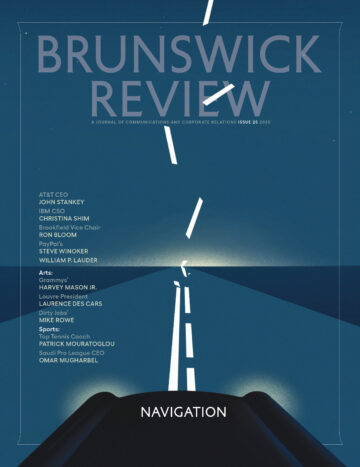
Navigation
Most read from this issue

The Guardians of Good Works

